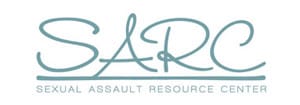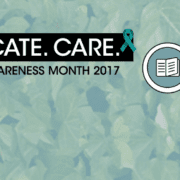What will you do for SAAM?

April is Sexual Assault Awareness Month (SAAM), but SARC wants you to be more than just “aware.” This year, we organized a series of events around our action-oriented theme: “ACT. EDUCATE. CARE.”
According to Google, awareness is a “concern about and well-informed interest in a particular situation or development.” To be aware is important. It means to be continually conscious of sexual assault in our communities and how sexual violence thrives in our culture. Awareness, however, can also easily slip into passivity. Once you are “aware” of the stark reality of sexual assault, what comes next?
To be part of the movement to end sexual violence, we must use our awareness as a springboard into action. This month, SARC is offering a variety of options for people to get involved.

We can ACT. Use our voices, bodies, and influence to share our stories as people affected by sexual violence, directly or indirectly. SARC’s philosophy reflects our knowledge that sexual assault impacts all people regardless of their gender, race, socioeconomic status, faith, immigration status, age, disability, sexual orientation, and all the other complex identities that make us human. It is our diverse experiences that make us resilient and courageous. We can write letters and make phone calls to our representatives. We can volunteer. We can interrupt sexism and other forms of oppression in the daily ways we witness and experience them.
And we can actively support our community members when they take action. Voices Against Violence on April 8th 6pm-9pm at Coyote’s Bar & Grill, is our first SAAM event, where local performers will share their music, poetry, comedy, and more to address sexual violence through their art.
We can EDUCATE. Misinformation and ignorance surrounding the dynamics of sexual assault abound. SARC believes in educating from a place of humility. We believe in calling in rather than calling out. All of us have the ability to educate those around us. By pointing out the normalization of sexual violence in our media. By challenging victim-blaming or perpetrator-sympathetic comments in the news and within our communities. By engaging in primary prevention, working with youth to define and model what healthy sexuality, consent, and healthy relationships look like.
And we can actively continue to educate ourselves. Let’s Talk About Sex(uality) on April 17th 6pm-8pm at the Beaverton Community Center, is our second SAAM event, where a panel of community partners will answer questions about what healthy sexuality and relationships mean to them.
We can CARE. Being supportive of those who are dealing with the impact of a sexual assault is one of the best ways we can counteract the trauma of violence in the first place. Being present, listening, respecting survivors’ choices, allowing each person’s unique healing process to run its course, and focusing on someone else’s needs rather than your wants for them is an incredible way to show that you care.
Whether you’ve survived an assault, are supporting a survivor, or are doing work to end sexual violence, it takes a lot of effort. Part of taking care is having compassion for yourself, which is why SARC’s third SAAM event, Dare to Self Care on April 30th 1pm-4pm at Taborspace, is a whole afternoon dedicated to self-care activities and sustainability.
Awareness and action don’t end when April is over. Think of these events as an invitation to join SARC for the first time, or as a chance to continue your commitment and relationship. The movement to end sexual violence is not SARC’s alone; it is all of ours. We cannot do this without you.
All events are free, open to the public, and family friendly.
You can help spread the word. Here are is our poster for these SAAM events, we appreciate your help to distribute through any and all channels and onto community boards, at your workplace break-rooms, schools, you get the picture!
Learn more about how to volunteer >
Learn more about how to donate >
RSVP for 40 Year Anniversary Fundraiser >



 our country’s ability to address issues around sexual assault, intimate partner violence, domestic violence, and stalking. Thanks to continued bipartisan reauthorizations, countless numbers of services and resources for survivors across the country are made possible through VAWA. Eliminating or even reducing VAWA’s federal funds would directly reduce resources for and the safety of survivors.
our country’s ability to address issues around sexual assault, intimate partner violence, domestic violence, and stalking. Thanks to continued bipartisan reauthorizations, countless numbers of services and resources for survivors across the country are made possible through VAWA. Eliminating or even reducing VAWA’s federal funds would directly reduce resources for and the safety of survivors.
